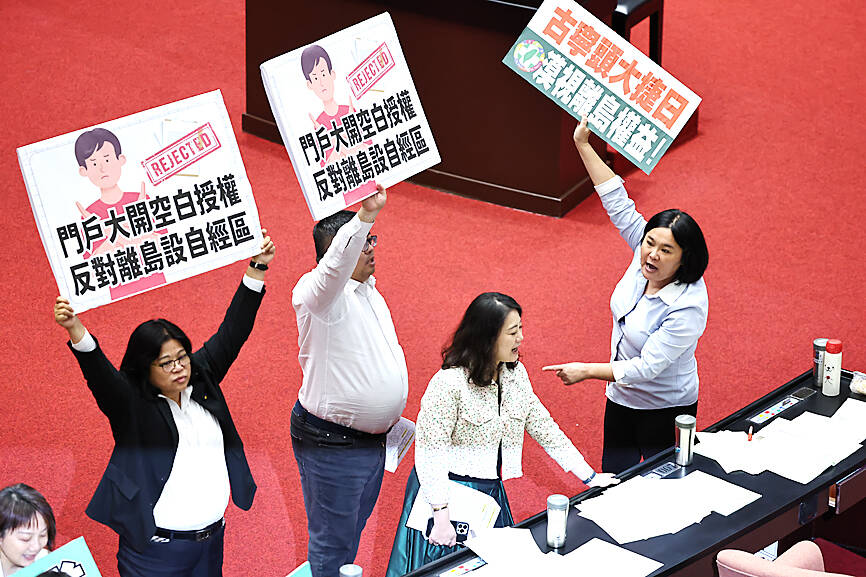Democratic Progressive Party (DPP) legislators yesterday warned that a Chinese Nationalist Party (KMT) proposal to create a “free-trade zone” on outlying islands could undermine Taiwan’s efforts to create a “non-red supply chain” by opening a “back door” for Chinese companies evading US tariffs.
DPP legislators Michelle Lin (林楚茵) and Puma Shen (沈伯洋) voiced their concerns during a meeting of the legislature’s Foreign Affairs and National Defense Committee.
The Foreign Trade Act (貿易法) was amended in 2019 to prevent China from “laundering” the origins of its products, Lin said.

Photo: CNA
That same concern is once again prevalent, as the KMT is proposing amendments to Article 18-1 of the Offshore Islands Development Act (離島建設條例) to create an “Offshore Free Trade Demonstration Zone,” Lin said.
People, companies, goods and services from China could enter the zone under regulations that are yet to be determined.
Lin said that China also makes items that the nation exports to the US, such as electronics, and it would be easy to say those Chinese-made items were from Taiwan instead.
The proposed amendments even state that “relevant regulations will be appropriately relaxed” to facilitate such endeavors, Lin said.
Such a proposal runs the risk of allowing Chinese companies, labor and freight to “launder” the origins of their products by going through the zone, she said.
Shen said that proposing amendments to allow Chinese companies and people to freely enter demonstration zones in Taiwan at a time when the nation is about to begin talks with the US on tariffs is questionable.
Mainland Affairs Council Deputy Minister Shen You-chung (沈有忠) said the act must observe the Act Governing Relations Between the People of the Taiwan Area and the Mainland Area (臺灣地區與大陸地區人民關係條例).
The council believes that the amendment should be reconsidered, especially given the national security concerns and lack of social consensus, he said.
Deputy Minister of Economic Affairs Cynthia Kiang (江文若) said the government was concerned over possible national security implications of the amendment and urged that such concerns be considered when it is discussed at the legislature.
Lin said that it would be favorable for Taipei during bilateral tariff talks if Washington sees that Taiwan is a democratic country observing the rule of law and that it has enacted legislation to prevent China from changing its products’ country of origin.
Deputy Minister of Foreign Affairs Chen Ming-chi (陳明祺) said that Taiwan is committed to working with the US to prevent “origin laundering.”
Additional reporting by CNA

The Coast Guard Administration (CGA) yesterday said it had deployed patrol vessels to expel a China Coast Guard ship and a Chinese fishing boat near Pratas Island (Dongsha Island, 東沙群島) in the South China Sea. The China Coast Guard vessel was 28 nautical miles (52km) northeast of Pratas at 6:15am on Thursday, approaching the island’s restricted waters, which extend 24 nautical miles from its shoreline, the CGA’s Dongsha-Nansha Branch said in a statement. The Tainan, a 2,000-tonne cutter, was deployed by the CGA to shadow the Chinese ship, which left the area at 2:39pm on Friday, the statement said. At 6:31pm on Friday,

The Chinese People’s Liberation Army Navy’s (PLAN) third aircraft carrier, the Fujian, would pose a steep challenge to Taiwan’s ability to defend itself against a full-scale invasion, a defense expert said yesterday. Institute of National Defense and Security Research analyst Chieh Chung (揭仲) made the comment hours after the PLAN confirmed the carrier recently passed through the Taiwan Strait to conduct “scientific research tests and training missions” in the South China Sea. China has two carriers in operation — the Liaoning and the Shandong — with the Fujian undergoing sea trials. Although the PLAN needs time to train the Fujian’s air wing and

The American Institute in Taiwan (AIT) put Taiwan in danger, Ma Ying-jeou Foundation director Hsiao Hsu-tsen (蕭旭岑) said yesterday, hours after the de facto US embassy said that Beijing had misinterpreted World War II-era documents to isolate Taiwan. The AIT’s comments harmed the Republic of China’s (ROC) national interests and contradicted a part of the “six assurances” stipulating that the US would not change its official position on Taiwan’s sovereignty, Hsiao said. The “six assurances,” which were given by then-US president Ronald Reagan to Taiwan in 1982, say that Washington would not set a date for ending arm sales to Taiwan, consult

A Taiwanese academic yesterday said that Chinese Ambassador to Denmark Wang Xuefeng (王雪峰) disrespected Denmark and Japan when he earlier this year allegedly asked Japan’s embassy to make Taiwan’s representatives leave an event in Copenhagen. The Danish-language Berlingske on Sunday reported the incident in an article with the headline “The emperor’s birthday ended in drama in Copenhagen: More conflict may be on the way between Denmark and China.” It said that on Feb. 26, the Japanese embassy in Denmark held an event for Japanese Emperor Naruhito’s birthday, with about 200 guests in attendance, including representatives from Taiwan. After addressing the Japanese hosts, Wang